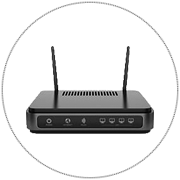
Monitoring
Every home security company provides security monitoring—at a minimum. When you compare security systems, look for the types of sensors they come with, which can include door and window, garage door, glass break, motion, and image. Some of these sensors depend on the plan you choose, so be sure to go over everything in detail with the sales representative. Also, certain sensors might be better than others in some instances, so factor in your home’s layout and size when deciding which sensors make the most sense.

















